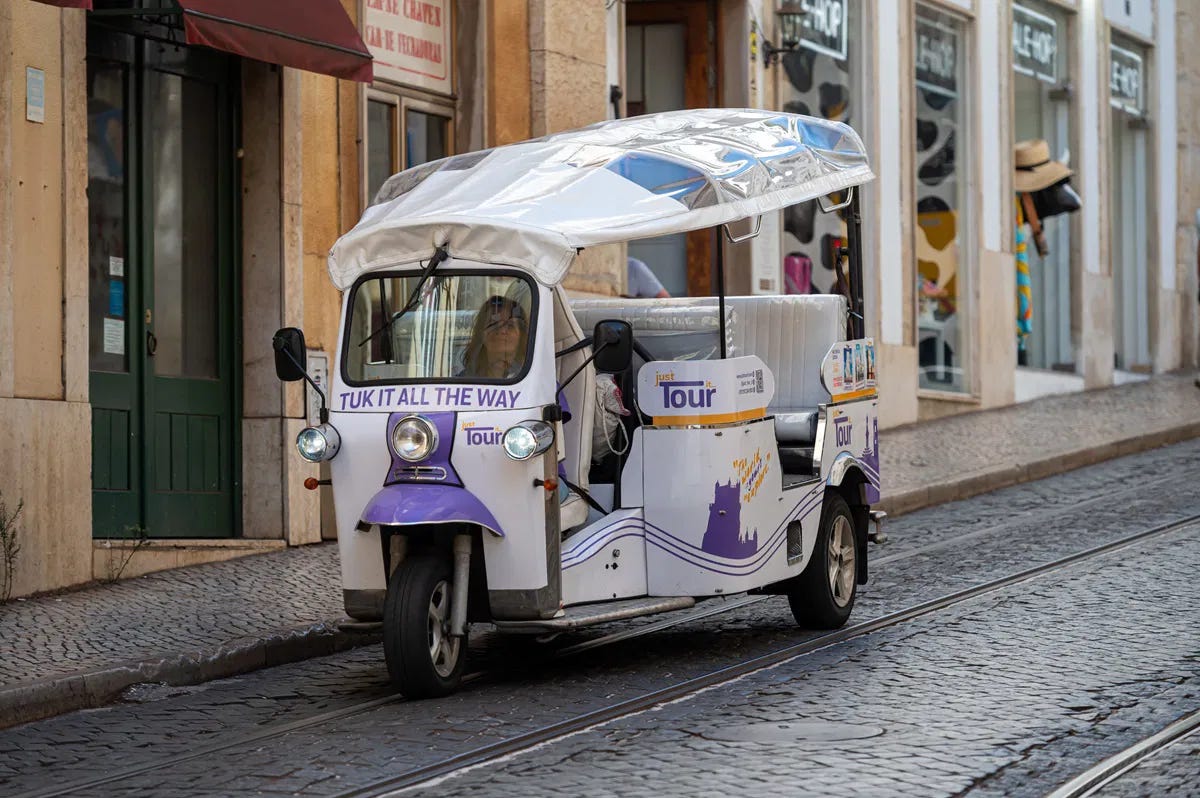Lisbon to ban tuk-tuks in much of the historic center
The new circulation rules, set to take effect on April 1, include a list of 337 streets - primarily in the historic center - where tuk-tuks will no longer be allowed to operate.

Starting April 1, tuk-tuks in Lisbon will face stricter regulations as the city council introduces new measures to curb the chaotic presence of these tourist vehicles.
A municipal order will prohibit tuk-tuks from operating on 67 additional streets, bringing the total number of restricted roads to 337.
Additionally, parking and passenger pick-up/drop-off will be limited to 51 designated zones, offering 251 spots for tuk-tuks.
The move comes as part of an immediate effort to address the disorder caused by tuk-tuks in popular areas of the city.
The move is expected to spark controversy, as the association representing the tuk-tuk sector has raised doubts about the legality of the measure.
The sector’s representatives argue that the ban could harm small businesses and question whether the city has the authority to impose such restrictions without broader consultation.
While the vehicles are popular among tourists for their convenience and novelty, residents and local authorities have increasingly criticized their impact on congestion and public space.
As the April 1 deadline approaches, the debate over the ban is likely to intensify, with both sides preparing to defend their positions in what could become a contentious battle over the future of tuk-tuks in Lisbon.
Rationale for the move
Filipe Anacoreta Correia, Deputy Mayor and head of Mobility for Carlos Moedas’ administration, explained to ECO/Local Online that the new rules aim to regulate the presence of tuk-tuks while acknowledging the city’s limited authority over tourism licensing, which falls under the jurisdiction of the national Ministry of Economy.
“We are faced with a challenge: this activity is licensed by national entities, and the city council has no control over it. Residents have raised concerns, but we lack the power to limit licensed vehicles,” said Correia.
He described the new restrictions as a “pioneering model” that, if successful, could be replicated elsewhere.
The city council has identified a critical issue with the lack of parking spaces for tuk-tuks, which currently stand at just 87 spots for an estimated fleet of over 1,000 vehicles.
Under the new rules, operators will have access to 250 designated parking and pick-up/drop-off spots for street-hailing services. An additional 150 spots may be added in a second phase, bringing the total to 400.
Tuk-tuks will also be allowed to operate for hotel pick-ups, local accommodations, and pre-booked online reservations.
However, the city council will enforce stricter monitoring of public space usage, particularly in areas like Terreiro do Paço near Cais das Colunas, where tuk-tuks have often overcrowded sidewalks.
“We want to limit tuk-tuks parked in public spaces and promote better coexistence in the city,” Correia emphasized.
The council plans to increase inspections using resources from EMEL (Lisbon’s mobility and parking company) and the Municipal Police.
New Regulations to Be Discussed in March
The city council is also preparing a broader regulatory framework for tuk-tuk operations, which will be discussed in a council meeting in March.
If approved, the draft will undergo a 30-day public consultation before returning to the council for final approval and a vote in the Municipal Assembly.
Correia expressed optimism about the new regulations, stating that they aim to balance the needs of the industry with the concerns of residents.
“We’ve engaged with sector stakeholders, and they understand the importance of tuk-tuks coexisting harmoniously with the city,” he said.
However, the deputy mayor acknowledged potential pushback from operators. “It’s natural for operators to react negatively when faced with limitations. We’ve made an effort to engage in dialogue and address their concerns,” he said, drawing parallels with the regulation of electric scooters, which faced similar challenges.
The council hopes to implement the new regulations as soon as possible, ideally by 2025. “An activity that doesn’t coexist well with the community has no future,” Correia concluded.
The measures reflect Lisbon’s ongoing efforts to manage its growing tourism industry while preserving the quality of life for its residents.



